【看新聞學英語】台灣人抗議與中國的貿易協定
【新唐人2010年7月11日訊】 【看新聞學英語】
Taiwanese Protest China Trade Deal
台灣人抗議與中國的貿易協定
By Jessy Chen, David Lee
【新聞關鍵字】
1. protest: v.抗議
2. hail: v.喝采、歡呼
3. call for: ph.要求、需要
4. bilateral: adj.雙邊的
5. circumstance: n.情況
6. clout: n. 影響力
7. be eager to: ph. 迫切、渴望
Saturday June 26th: Thousands take to the streets in Taipei, protesting the new Economic Cooperation Framework Agreement between Taiwan and mainland China.
6月26日星期六,有上千人走上台北街頭,抗議台灣與中國與這項新的經濟合作框架協議。
The deal will cut tariffs on some eight hundred products. It's been hailed as the most significant political agreement between the two sides in sixty years. Yet many Taiwanese fear the agreement will flood the Taiwanese market with cheap Chinese goods and create unemployment.
該項協定削減大約800項產品的關稅。這是兩岸60年以來,最重要的政治協定,而受到歡迎。然而,很多台灣人擔心,這項協議將使台灣到處充斥著來自中國的廉價商品及造成失業。
This rally was organized by Taiwan’s opposition party, the DPP, and protestors here are calling for a better deal—plus supervision by the World Trade Organization.
這次集會是由台灣的反對黨民進黨所發起,抗議者要求更好的交易條件,且要由世界貿易組織來監督此項協定。
[Huang Shu-Cheng, Rally Attendee]:
"The World Trade Organization is an international forum. It has complete responsibilities and duties, like making sure the whole world is equal. If we sign a bilateral agreement with China, it will certainly not be a fair one.”
[黃淑晶,集會參加者]:
“世界貿易組織是一個國際論壇。它有完全的責任和義務,如確保全世界交易平等。如果我們與中國簽署雙邊協議,這肯定不會是公平的協議。 “
Taiwan has been governed separately since the Chinese civil war in 1949. The Chinese communist regime regards Taiwan as a breakaway province and has always called for unification of the two sides.
自1949年中國內戰起,台灣一直是各別統治。中國共產政權視台灣為分裂的省份,並一直要求兩岸統一。
[黃淑晶,集會者]:
“China does not even recognize us as a country, when we sign under these circumstances, it will give China more clout over us."
[黃熟成,集會者]:
“中國甚至不承認我們是一個國家,當我們在這種情況下簽署,它將給中國帶來更多可以左右我們的影響力。“
Taiwan’s president, Ma Ying-jeou, has been pushing the deal. He fears the country would lose out to foreign competition in the Chinese market if a deal is not signed. Yet many feel there are disadvantages for Taiwan—and they're eager to make their voices heard.
台灣總統馬英九,一直在推動這項協定。他擔心如果沒有簽署這項協議,台灣會輸給在中國市場的外國競爭。然而,很多人覺得這項協議有很多是不利於台灣,他們渴望讓大家聽到他們的聲音。
[Hsu Feng-e, Rally Attendee]:
“Because everything has a good and a bad side, you cannot just talk about the advantages and leave the disadvantages out. If you make good politics that have more advantages than disadvantages, then, of course, people will support this; but if there are more disadvantages, should we really have to support the authorities?"
[徐楓娥,集會者]:
“因為每件事都有好的一面與壞的一面,你不能只談論它的優點而忽略缺點。如果你施政是優勢大於劣勢,那麼,當然,人們會支持;但如果有更多的缺點,難道我們就必須要支持執政當局嗎??“
The deal will be signed in the Chinese city of Chongqing on June 29th.
該協議將於6月29日在中國重慶簽署。
本新聞影音出處:新唐人電視台英語新聞http://english.ntdtv.com/ntdtv_en/ns_china/2010-06-28/112785917865.html
【每日一句】
I'm under a lot of pressure.
我的壓力很大
【今日諺語】
It is the first step that costs troublesome.
萬事開頭難
相關新聞
-
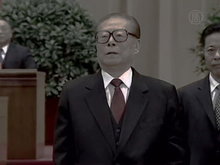
【看新聞學英語】死亡傳聞後 江澤民出席辛亥慶典
2011-10-11 22:26:55死亡傳聞後 江澤民出席辛亥慶典 ,【看新聞學英語】死亡傳聞後 江澤民出席辛亥慶典
-
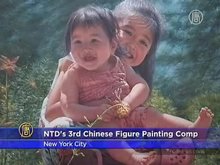
【看新聞學英語】法輪功藝術家在NTD TV 油畫大賽表現出眾
2011-12-25 21:35:09他們必須表達中國五千年歷史的傳統及正統文化面 ,【看新聞學英語】法輪功藝術家在NTD TV 油畫大賽表現出眾
-
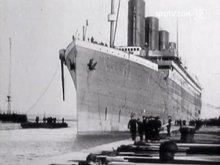
【看新聞學英語】鐵達尼沉船屆百年
2012-04-19 21:51:55進水的船頭沉入大海,將船尾提升至空中。這讓船咬斷為二。 ,【看新聞學英語】鐵達尼沉船屆百年
-

【看新聞學英語】薄西來否認兒子開法拉利
2012-03-18 14:14:56在記者會上,薄西來也說,他兒子是全額獎學金念牛津和哈佛。現在一些媒體,包括華爾街日報,都在挖這條新聞 ,【看新聞學英語】薄西來否認兒子開法拉利
-
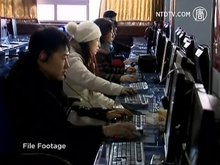
【看新聞學英語】中國媒體審查機制顯示防火長城將「變遷」
2012-04-19 21:51:581989年天安門抗議事件和大屠殺,或是法輪功精神運動,及其被共產勢力的迫害。 ,【看新聞學英語】中國媒體審查機制顯示防火長城將「變遷」
-
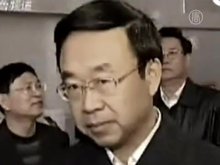
【看新聞學英語】遭罷黜中國官員驚傳收巨賄及包養46名情婦
2011-12-20 19:36:16黃勝因疑似「嚴重違反紀律」遭解職 ,【看新聞學英語】遭罷黜中國官員驚傳收巨賄及包養46名情婦
-
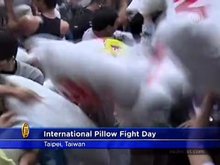
【看新聞學英語】台灣人枕頭大戰抒壓
2012-04-17 12:48:48商人Qunnie發現枕頭大戰很受歡迎,分散對生活成本上漲的注意力。 ,【看新聞學英語】台灣人枕頭大戰抒壓
-

【看新聞學英語】iPad 3問世(高畫質螢幕、4G網路,499美元起)
2012-03-18 14:14:51新的iPad現在有一個目前所有行動裝置上解析度最高的310萬像素顯示器,提供銳利的文字和令人難以置信的照片和影片細節 ,【看新聞學英語】iPad 3問世
-

【看新聞學英語】倫敦動物園幫動物量測身高體重(上)
2011-09-11 10:28:24倫敦動物園幫動物量測身高體重(上) ,【看新聞學英語】倫敦動物園幫動物量測身高體重(上)
-

【看新聞學英語】2012金氏世界紀錄新得主亮相
2011-09-22 18:52:422012金氏世界紀錄新得主亮相 ,【看新聞學英語】2012金氏世界紀錄新得主亮相
-
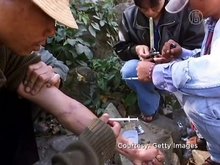
【看新聞學英語】以色列男子公開長期戒毒奮鬥
2011-11-10 14:37:24以色列男子公開長期戒毒奮鬥 ,【看新聞學英語】以色列男子公開長期戒毒奮鬥
-

【看新聞學英語】披頭四罕見照片拍賣
2011-10-04 21:01:03披頭四罕見照片拍賣 ,【看新聞學英語】披頭四罕見照片拍賣
-

【美容養顏】不用買昂貴保養品,輕鬆體驗古代皇后級的護膚美容法「面白脫如雪,身光白如素」 | 胡乃文開講02
2020-02-11 17:53:25以中醫的觀點來說,「皮膚是五臟六腑的鏡子」,大多數的東方女性認為皮膚白皙,看起來就漂亮、健康。在古代,皇后貴妃為博得皇帝的寵愛,也十分注重身體各部位的保養,使得自己「面白脫如雪,身光白如素」。
-

【看新聞學英語】100歲英國男子預備創馬拉松紀錄
2011-10-30 18:35:14100歲英國男子預備創馬拉松紀錄 ,【看新聞學英語】100歲英國男子預備創馬拉松紀錄
-
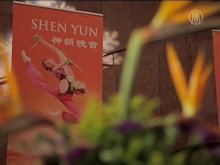
【看新聞學英語】韓國歌手 神韻保存傳統文化
2012-03-22 15:53:45觀看這場演出,對我是來說是很愉快的經驗 ,【看新聞學英語】韓國歌手 神韻保存傳統文化
-
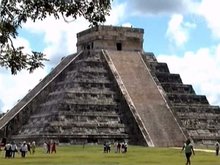
【看新聞學英語】預估旅遊興旺 因瑪雅倒數至2012年將近
2011-10-04 21:04:22預估旅遊興旺 因瑪雅倒數至2012年將近 ,【看新聞學英語】預估旅遊興旺 因瑪雅倒數至2012年將近
-

你知道嗎?有一種神奇的天然染髮劑不傷髮質,染完後還能長出黑髮|胡乃文開講04
2019-12-03 15:13:01有一種天然的染髮劑染完後不傷髮質,更厲害的是,長出來的頭髮都是黑色的。。。
-
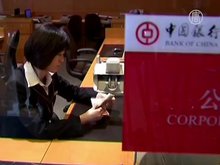
【看新聞學英語】中國經濟成長減緩
2011-10-30 18:35:17中國經濟成長減緩 ,【看新聞學英語】中國經濟成長減緩
-
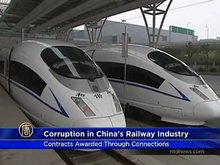
【看新聞學英語】中國子彈列車貪污醜聞
2012-03-09 14:06:04供應商之間這種仰賴人際甚於競爭,和招標的關係,己導致中國火車,以天價製造。現在國內生產零件與進口的成本,幾乎相同。 ,【看新聞學英語】中國子彈列車貪污醜聞
-
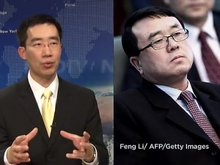
【看新聞學英語】調查王立軍可能意味薄熙來的未來慘淡
2012-02-18 20:33:47國西南省級的重慶高階官員薄熙來的政治風暴,可能正醞釀當中。 ,【看新聞學英語】調查王立軍可能意味薄熙來的未來慘淡
































